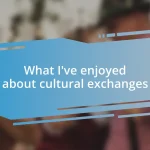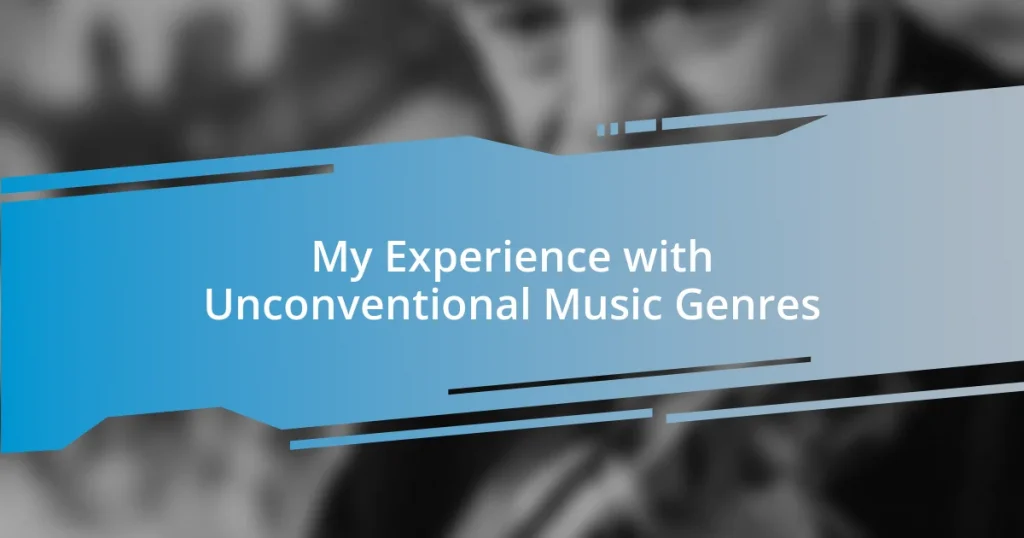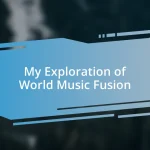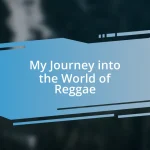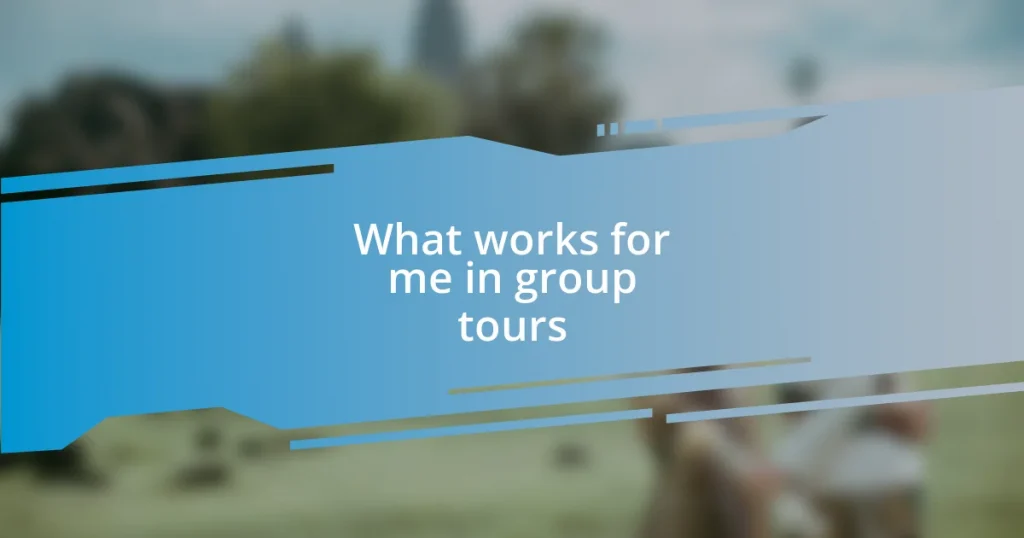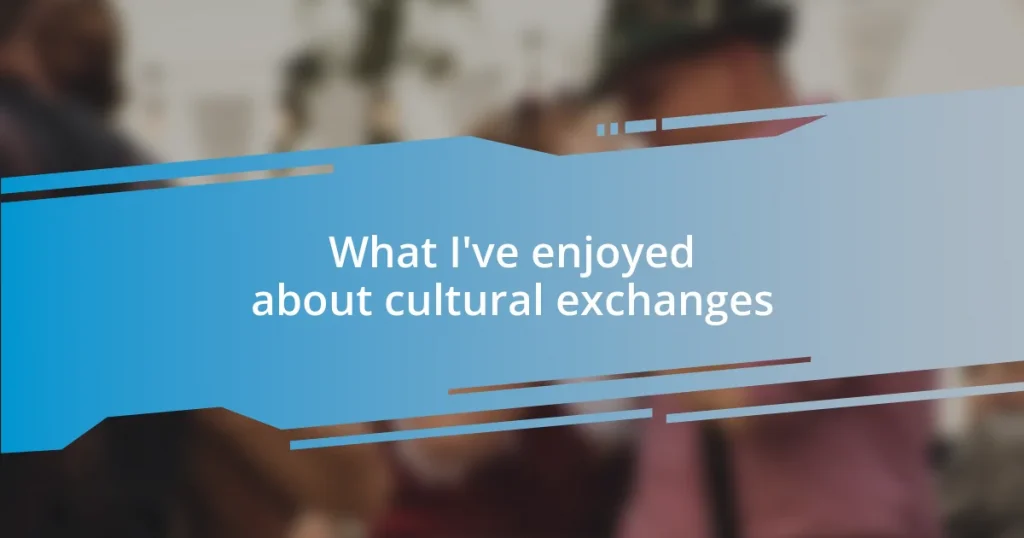Key takeaways:
- Discovering unconventional music genres, like post-rock and noise music, deeply impacts emotional experiences and challenges preconceived notions of sound.
- Engaging with diverse genres fosters community and connections, as shared musical experiences evoke communal joy and personal reflection.
- Collaborating with others and sharing music enhances discovery and appreciation, revealing the rich stories and emotions embedded within each track.
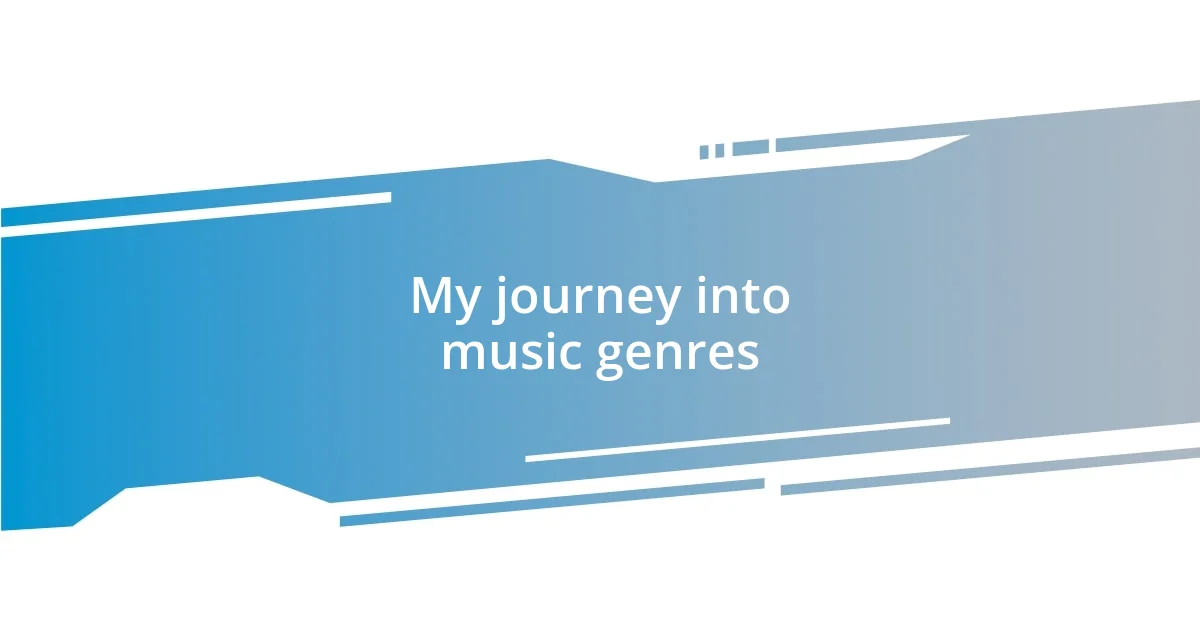
My journey into music genres
Music has always been a part of my life, but it wasn’t until I stumbled upon a local underground scene that my journey into unconventional genres truly began. I remember the first time I heard a group mixing hip-hop with jazz—a sound so fresh and unexpected that it made me rethink what music could be. Has a single moment ever changed how you view your favorite songs?
As I dug deeper into genres like post-rock and synth-pop, I found myself captivated by how they evoke emotions differently than mainstream music. One evening, while listening to a lengthy post-rock track, I felt a flood of nostalgia wash over me; it transported me to memories of childhood adventures. Isn’t it fascinating how certain sounds can unlock hidden feelings?
Attending live performances of these unconventional genres was transformative too. There’s something electric about being in a room filled with individuals who share a passion for music that’s outside the norm. I distinctly remember the feeling of unity as we collectively swayed to the rhythm, creating a rare connection through shared experience. Isn’t that the magic of music – its ability to bring us together, even when it’s a little offbeat?
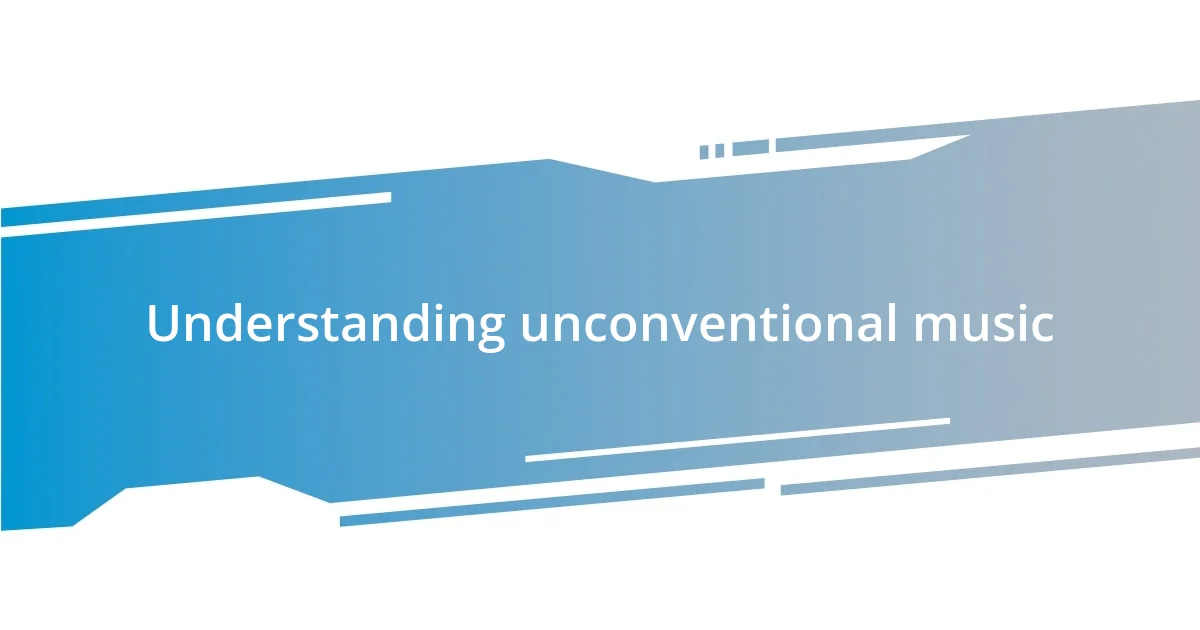
Understanding unconventional music
Understanding unconventional music can be an enlightening experience that challenges our preconceived notions of sound and structure. For instance, when I first encountered noise music, I found it jarring yet oddly captivating. I remember thinking, “Is this even music?” But as I listened more, I began to appreciate the layers and intentions behind the chaos, revealing an expressive landscape that traditional genres often overlook.
Here’s what I’ve come to understand about unconventional music:
- It often breaks the traditional rules of melody, harmony, and rhythm, creating unique listening experiences.
- Artists in these genres frequently experiment with unconventional instruments and production techniques.
- The emotional range in unconventional music can be vast, sometimes eliciting feelings of discomfort, curiosity, or profound introspection.
- Discovering new sounds often leads listeners to explore their identity and feelings in ways that mainstream music might not encourage.
- Engaging with unconventional styles fosters a sense of community among those who appreciate the shared adventure of exploring new sonic territories.
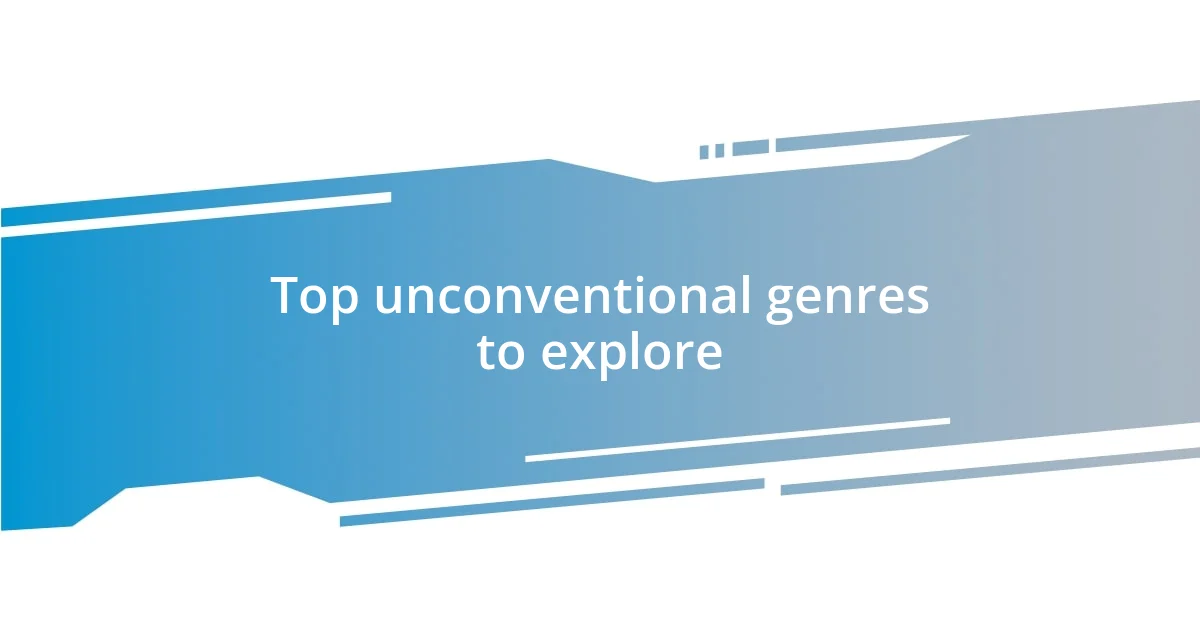
Top unconventional genres to explore
When it comes to unconventional genres, there’s a treasure trove waiting for exploration. Take lo-fi hip-hop, for example. I stumbled upon it during a late-night study session, and since then, it has become my go-to for creative inspiration. The soothing beats combined with atmospheric sounds create an almost meditative environment that I never knew I needed. Have you ever felt that perfect vibe while working?
Another genre worth diving into is gypsy jazz, which fuses improvisational skills with a distinctive swing feel. I vividly remember the first time I heard it; it felt like I was transported to a Parisian café, surrounded by laughter and swirling dances. This music really knows how to make you feel grounded yet whimsical at the same time. I’m curious; which genres have surprised you with their emotional depth?
Finally, let’s not forget about vaporwave. I recall a rainy day when I immersed myself in its nostalgic samples and surreal aesthetics. It made me reminisce about the early internet era, invoking a sense of yearning for simpler times. The playful commentary on consumerism can be both quirky and thought-provoking, making it a unique experience that begs deeper reflection. Isn’t it interesting how music can evoke such varied feelings and memories?
| Genre | Emotion Triggered |
|---|---|
| Lo-fi Hip-Hop | Calm and Focus |
| Gypsy Jazz | Joy and Whimsy |
| Vaporwave | Nostalgia and Reflection |
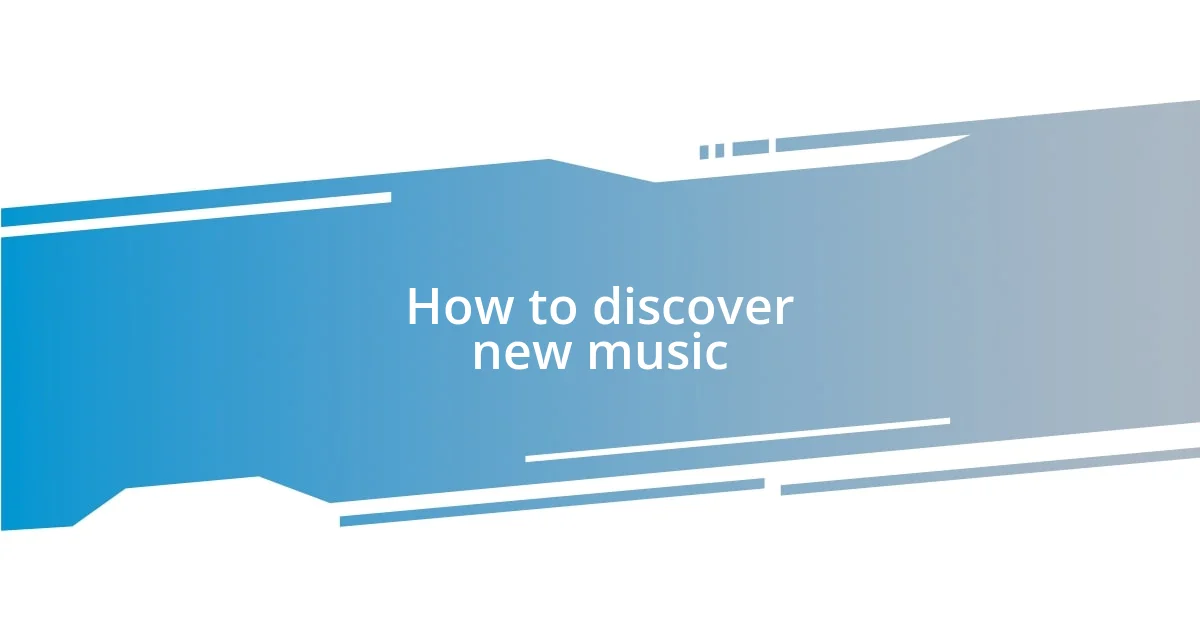
How to discover new music
Finding new music can feel like embarking on a treasure hunt, especially in the realm of unconventional genres. I remember scrolling through music forums late one night, stumbling upon a recommendation for a band that blended electronic beats with classical instrumentation. The first listen was a revelation! Have you ever experienced that rush when something unexpectedly resonates with you? It’s thrilling to realize the vast diversity just waiting to be explored.
One of my favorite methods for discovering new sounds is using social media platforms. I often dive into curated playlists created by music enthusiasts. Just the other day, someone posted a collection of experimental artists that brought a fresh perspective to the familiar sounds I thought I knew. It felt like rediscovering music all over again. Hashtags can also lead you down interesting rabbit holes. I once found an artist tagged with #AvantGarde, and it completely broadened my listening landscape.
Collaborating with friends can also open up new avenues for musical discovery. I had a friend who introduced me to Japanese city pop, and I vividly recall our late-night conversations dissecting its funky rhythms and nostalgic vibes. Sharing thoughts and feelings about the music can deepen your understanding and appreciation. Who knows? You might stumble across your next favorite genre by simply sharing experiences with others.
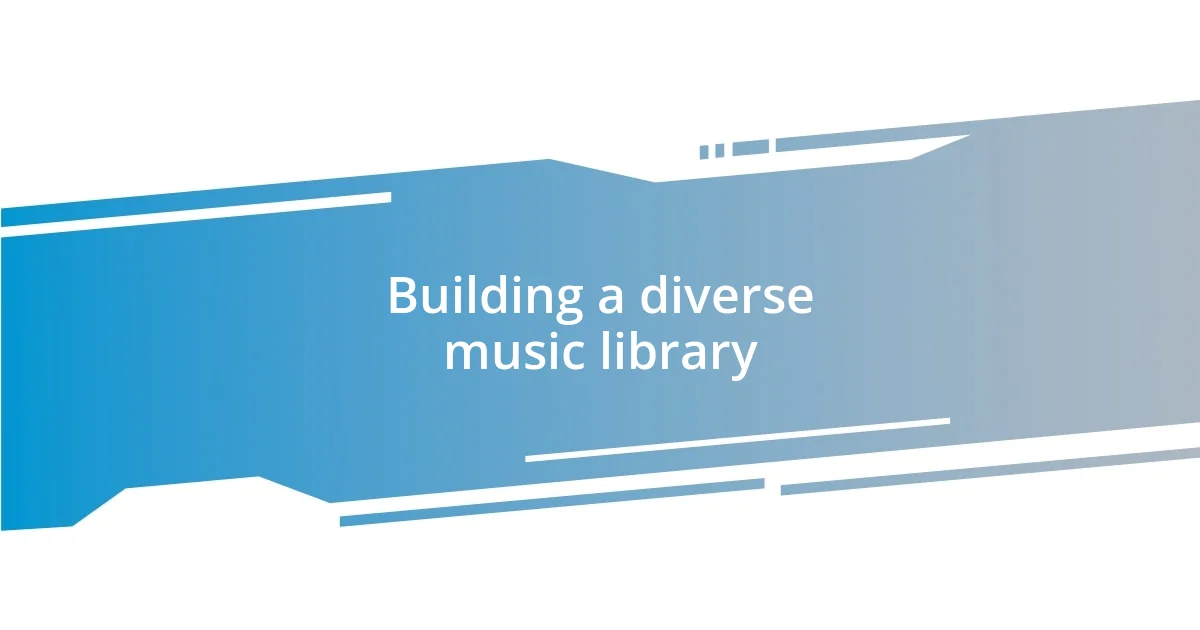
Building a diverse music library
Building a diverse music library is all about embracing the unexpected. I vividly recall the day I decided to explore the world of experimental music. I threw on my headphones, and as the unconventional sounds washed over me, I felt liberated. Have you ever listened to something so different that it changed the way you think about music? It opened my eyes to how varied musical expression can be.
To truly cultivate diversity in your library, it’s essential to step outside your comfort zone. I remember attending a local music festival where I stumbled upon an avant-garde performance. At first, I was hesitant, but I quickly found myself captivated by the eclectic fusion of styles. The sensation of discovering something fresh and uncharted is exhilarating. Isn’t it fascinating how each genre brings with it a unique story or cultural perspective?
In my experience, curating a diverse music collection is an ongoing journey. I often revisit tracks from different genres, retracing my footsteps and seeing how my tastes have evolved. Just recently, I revisited some belly dance music I once thought was simply rhythmic background noise. Listening again, I found layers of complexity that I had previously overlooked. What hidden gems are waiting for you to rediscover in your collection?
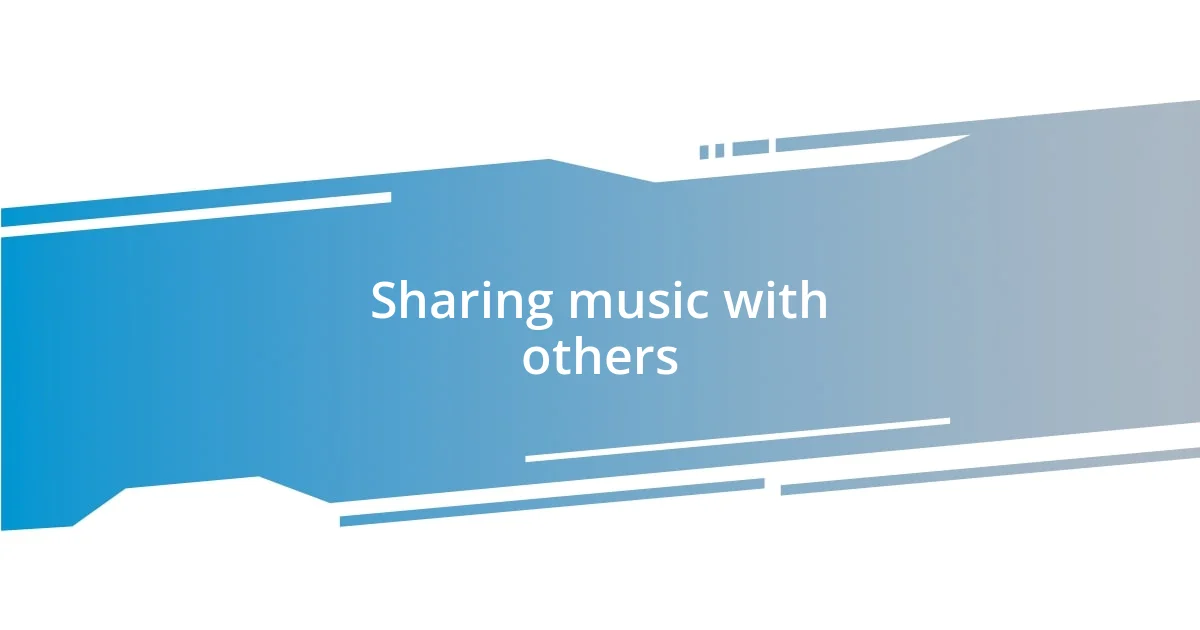
Sharing music with others
Sharing music with others is one of the most rewarding experiences I’ve had. I remember inviting a few friends over for a music night, and we brought our favorite tracks to the table. As we played our selections, I felt a rush of excitement when a friend’s eyes lit up at a quirky indie band I shared. Have you ever seen someone truly connect with a song in a way that makes you feel proud to have introduced it to them?
Engaging in these musical exchanges can lead to surprising discoveries. I once shared a track from an artist known for blending traditional folk with modern electronica. It was a gamble, but the moment my friend exclaimed, “This is incredible!” I felt that shared joy transform the room. What is it about music that creates such immediate connections? I believe it’s the raw emotions and stories that resonate with us on a deeper level.
I often think about how sharing music acts like a bridge. My experience with this became clear when my cousin played a forgotten old jazz record that made me realize the nuances in improvisation really create an intimate listening experience. I asked him why he loved that genre, and he shared heartfelt memories of listening to it with his father. Isn’t it fascinating how a song can unlock so much emotion and personal history? Sharing music is not just about the notes; it’s about the stories and feelings that come along with each track.


